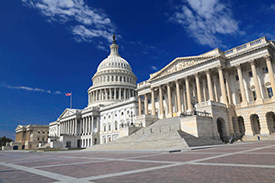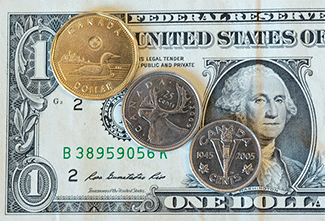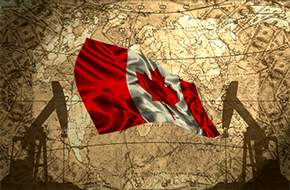 There’s a topic weighing heavily on the minds of Canadian business owners right now, and that’s the U.S. election scheduled for Nov 8th. Regardless of which candidate you prefer, the outcome will affect the economy in many ways. Since Canadians aren’t able to vote and help determine the way forward, all you can do is watch closely and try to plan ahead for whatever scenario unfolds.
There’s a topic weighing heavily on the minds of Canadian business owners right now, and that’s the U.S. election scheduled for Nov 8th. Regardless of which candidate you prefer, the outcome will affect the economy in many ways. Since Canadians aren’t able to vote and help determine the way forward, all you can do is watch closely and try to plan ahead for whatever scenario unfolds.
Here are some of the potential issues you can expect to see depending on who wins, and ways to ensure you’re able to weather the storm.
What to Expect
General analysis of the two candidates show Hillary Clinton to be a realist, but with a strong “left of centre” support base she will be forced to lean left to satisfy them. Donald Trump, on the other hand, has a strong conservative approach but will likely to find it more difficult than he expects to move the needle drastically to the right. American business as a whole has huge investments both inside and outside of the U.S., and those aren’t going to grind to a sudden halt.
Over time, however, it could become more expensive and less lucrative for U.S. companies to trade with Canadian businesses, but that will take a while to happen.
It’s More Than One Race – Big Issues to Watch
 The election is not about just one person, although news coverage would make you think they are the only people on the planet that count. So, forget about who you can marry or which email server to use. The other big issues to keep an eye on in the coming election are:
The election is not about just one person, although news coverage would make you think they are the only people on the planet that count. So, forget about who you can marry or which email server to use. The other big issues to keep an eye on in the coming election are:
- Congressional races, because that’s where future legislation is enacted, stalled, or scrapped completely. If one party controls both, they can stall legislation. If split between the parties, the Senate gains focus as the majority party there has great control. Stagnation or some move to compromise; shift to the left or to the right? Free trade? It’ll depend on who wins and the message voters send with their choices.
- The impact on the Supreme Court, where the effects of who is appointed and approved by Congress will cast the die for decades to come and tilt the outcome of many core issues – either toward reform or a reactionary position.
While these issues will determine the future of life as we know it to a great extent, there are others that can have a significant effect on business over the long term.
The Not-So-Big but Just-As-Important Issues
The U.S. elections can have big impacts on the four primary areas that have a significant effect on the flow of wealth in Canada and are the axes around which its national economy turns. These are:
- The housing market,
- The loonie-to-USD exchange rate,
- Immigration, and
- The long-suffering Canadian oil industry.
Any one of these core economic areas can impact the economy, in the following ways:
Exchange Rate
 [quotes]The strong U.S. dollar is making the loonie seem like pocket change,[/quotes] but whatever the outcome of the election, if the market reads it as a negative, the USD could weaken. This is bad news for Canadian export businesses and those that get paid in USD, who are currently enjoying an exchange rate of CAD 1.31 or thereabouts to the dollar.
[quotes]The strong U.S. dollar is making the loonie seem like pocket change,[/quotes] but whatever the outcome of the election, if the market reads it as a negative, the USD could weaken. This is bad news for Canadian export businesses and those that get paid in USD, who are currently enjoying an exchange rate of CAD 1.31 or thereabouts to the dollar.
While a stronger loonie might help increase local purchasing power, [quotesright]few companies operate in a vacuum with no involvement in USD. [/quotesright] Analysts predict the fallout will be less with a Clinton presidency, but since neither candidate is a clear favourite, it’s possible whatever the final result is, it will affect the exchange rate.
Housing Market
[quotesright]If the rhetoric can be believed, a Trump presidency will result in a mass exodus to Canada from the U.S.[/quotesright] While that’s unlikely to actually happen, what might occur is a spike in housing prices, according to the recent Economist Magazine’s Canada Summit in Toronto. Since homes in “hot property” areas such as Toronto and Vancouver are already in the midst of a pricing bubble, this is likely to make ownership harder than before for prospective buyers.
A Clinton presidency, on the other hand, may help keep the economy more stable, at least in the short term, which would mean a slowdown in prices. Good news for new buyers, not so good for sellers. And for companies who operate in the real estate industry, a slower market means less revenue.
Oil Industry
 The recent announcement by Saudi Arabia that it would resume capping oil production gave a boost to Canadian oil resulting in a stock price spike on the day of the announcement. There’s no long-term recovery in sight, however, for the 100,000-odd unemployed Alberta oil workers who just passed their two-year anniversary since being laid off.
The recent announcement by Saudi Arabia that it would resume capping oil production gave a boost to Canadian oil resulting in a stock price spike on the day of the announcement. There’s no long-term recovery in sight, however, for the 100,000-odd unemployed Alberta oil workers who just passed their two-year anniversary since being laid off.
A Trump presidency could revitalize the Keystone XL oil pipeline deal and could absorb some of the industry’s job losses, while a Clinton term is more likely to support the status quo. [quotesrigtht]That makes Trump the preferred candidate for much of Western Canada, [/quotesright] because he’s more likely to give oil workers back at least some of their livelihood. Include in this equation the many small businesses that benefit from a thriving society, such as after-school dance classes, child care, home-repair companies, car dealerships and even mom-and-pop-style restaurants.
Immigration
The position of both candidates is clear when it comes to immigration policy. [quotesright]What’s less clear is how businesses owned by immigrants and new Canadians will be affected,[/quotesright] particularly by a win by Donald Trump. We know he loves Canada, but since U.S. lawmakers have started expressing concerns over cross border drug smuggling and human trafficking plus Canada’s influx of Syrian refugees, self-employed new arrivals may find it challenging to do business if border controls become stricter and especially if it involves visits to the U.S. on a foreign passport. And with Canada actively supporting and encouraging immigrant business ventures, this could become a major stumbling block.
Planning Ahead
 [quotes]We’re still a week out from the election, so ideally you should use this time to prepare for either eventuality if you haven’t already done so.[/quotes] For businesses with a strong U.S. component, shore up your position ahead of time by negotiating long-term pricing arrangements with clients and suppliers in your preferred operational currency, where possible:
[quotes]We’re still a week out from the election, so ideally you should use this time to prepare for either eventuality if you haven’t already done so.[/quotes] For businesses with a strong U.S. component, shore up your position ahead of time by negotiating long-term pricing arrangements with clients and suppliers in your preferred operational currency, where possible:
- If your prices are fixed and agreed ahead of time, exchange rate fluctuations are less likely to impact you.
- For companies who buy raw materials and labour in CAD, you’ll want to be sure you’re getting an adequate return in the same currency, so fix your selling prices to the value of the loonie.
- If your cost of sales is mostly in USD, you might find a weaker USD causes purchase prices to rise. You’ll need to be able to recoup those increases so leave yourself some “wiggle room” when you’re finalizing pricing arrangements.
[quotesright]Whatever the outcome, it’s going to be something of a wild ride for Canadian business owners. [/quotesright] You’ll do best if you have a strong, long-term strategy that enables you to grab any opportunities that become available. If chaos ensues, you want to be able to keep doing business in Canada with local clients and suppliers. An experienced business coach can help you to spread your risk, maintain a positive cash flow, and plan for either eventuality.














